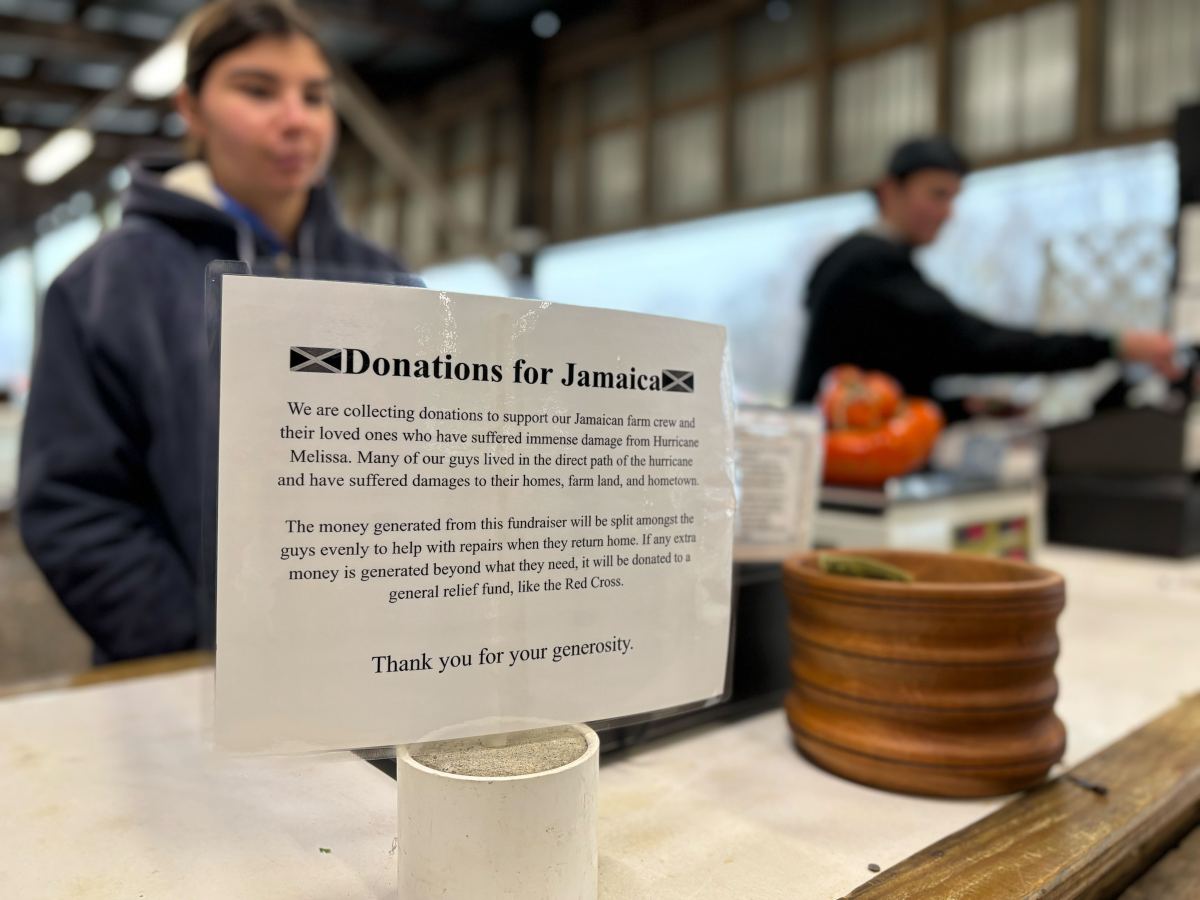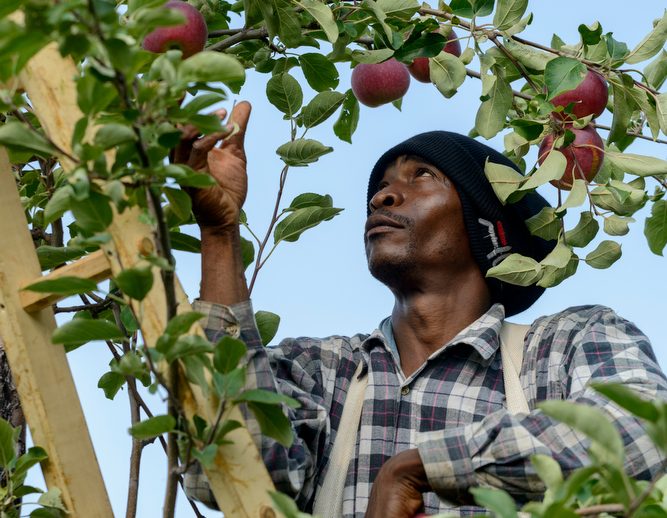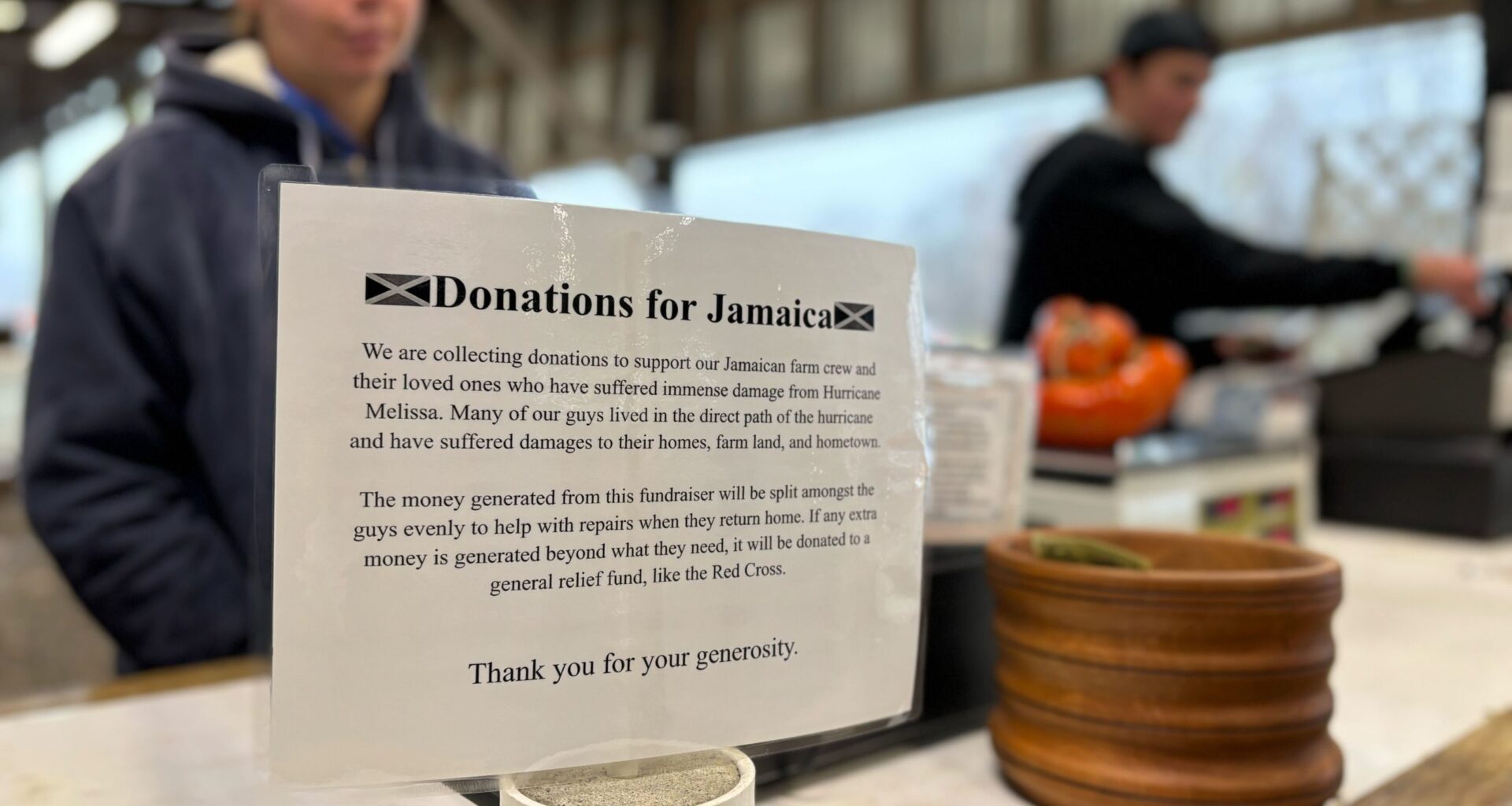 A sign at Paul Mazza’s farmstand in Essex on Friday Oct. 31, 2025, asking customers to support their Jamaican farmworkers in the aftermath of Hurricane Melissa. Photo by Auditi Guha/VTDigger
A sign at Paul Mazza’s farmstand in Essex on Friday Oct. 31, 2025, asking customers to support their Jamaican farmworkers in the aftermath of Hurricane Melissa. Photo by Auditi Guha/VTDigger
Sunrise Orchards in Cornwall has been hustling to harvest 150 acres of apples with the help of 25 Jamaican seasonal workers like Dwayne Brown.
“I pick apples, I pack apples, I prune, and I make cider,” said Brown, 41, who has been working at Sunrise for eight years.
Many of his fellow Jamaican farmworkers, however, have recently left to travel back to the Caribbean island about 3,000 miles away to deal with the devastation recently spurred by Hurricane Melissa.
“All of them are affected,” said farm owner Barney Hodges. “Their homes have been damaged. A lot of them have small farms and those farms were pretty much destroyed.”
Brown said his home and family were spared – he lives on the Kingston side of the island which was damaged the least – but knows many of his fellow workers and friends have not been quite as lucky.
Hodges said he has been helping the farmhands travel back to Jamaica in the aftermath of the strongest hurricane to hit the island nation since 1851. Melissa made landfall last Tuesday with winds of 185 mph, far above the minimum for a Category 5 storm, the strongest classification for hurricanes, according to The Guardian.
Brown was home in Jamaica before it hit and has been tracking the storm in the news from Vermont since it was predicted.
“I knew it was going to be a kind of catastrophic, devastating hurricane,” he said. But he did not expect the extent of the “horrible damage” it caused to the western parishes. About 28 people have died in Jamaica, according to BBC News. The death toll is expected to rise.
That disaster — which has also hit Cuba, Haiti and the Dominican Republic — has trickled down to impact Vermont farms, many of which have for years employed seasonal workers like Brown.
Every year, about 450 skilled Jamaican farmworkers travel to the Green Mountain State to help tend, pick and pack produce through the H2A visa program, according Alyson Eastman, deputy secretary of the Agency of Agriculture, Food and Markets in Vermont.
Most of the apples Vermonters buy at local markets and farmstands are picked by people from Jamaica.
“Either an H2A worker picked it, or it was a pick-your-own. Those are usually the two ways you get an apple in Vermont,” she said.
There are likely between 150 and 200 Jamaican farmworkers in the state currently, and Eastman said they are “essential to harvesting the fruits and vegetables that you and I enjoy.”
 Cornwall, Vermont (August 21, 2013) – Apple picking at Sunrise Orchards. (Photo © 2013 Brett Simison)
Cornwall, Vermont (August 21, 2013) – Apple picking at Sunrise Orchards. (Photo © 2013 Brett Simison)
Vermont has in recent years increased the number of seasonal hires across multiple sectors. Naomi Wolcott-MacCausland at the University of Vermont estimates there are nearly 600 seasonal workers here annually; about 85% of them come from Jamaica. And more than half of those workers come to help on orchards, said Wolcott-MacCausland, program coordinator of UVM’s Bridges to Health program, which helps migrant workers access health services.
Some come for up to 10 months, helping with everything from pruning to harvesting; others come to help harvest for a 6-week stint. Brown said he typically works at the orchard from August or September through March, April or May.
He said he enjoys the work and the peace and quiet of Vermont. “It’s a good place to work, good company to work for, a good boss who ensures that all is well with us. He takes care of us,” he said. “So yeah, we love to come here to farm.”
In addition to seasonal agricultural workers, Vermont employers hire approximately 1,400 seasonal workers in areas such as food and skiing year round. They come from many countries across the world, including Jamaica, Wolcott-MacCausland said.
Killington Resort in Rutland County, for instance, hires 100 winter workers, and is trying to figure out how to best help them and their families during hurricane recovery efforts, according to Josh Reed, communications manager, who called the situation in Jamaica “heartbreaking.”
“Many have lost their entire homes and are struggling to get food and water. Some are still trying to get in contact with loved ones back home,” he said.
“Vermont has a unique reliance on Jamaican workers, many of whom have been coming to Vermont for decades,” said Wolcott-MacCausland.
“From apples to carrots to maple syrup and skiing, the food, activities, and landscape we cherish in Vermont are possible in part due to this workforce,” she said.
Local aid efforts
Sixteen of the farmworkers at Sunrise Orchards went home ahead of the storm, and three others left last Thursday, said Hodges, who doesn’t have contact with those who live on Montego Bay — among the worst affected where entire communities and infrastructure have been demolished due to flooding and mudslides, according to news reports.
“The communications are still down. I haven’t been able to reach any of the workers in the hardest hit areas,” Hodges said.
Those he has been in touch with, who live in other parts of the island, told him their properties have been damaged but they and their families are safe, he said.
“They all are just grateful to be alive,” said Hodges, who recently signed onto a crowdfunding effort to aid Jamaican farmworkers in Vermont.
Established by Champlain Orchards on behalf of Vermont orchards that employ seasonal farmworkers, the Vermont Apple Growers’ Support Fund for Jamaican Seasonal Workers has raised more than $55,000.
“Our workers are hearing stories of severe devastation. They’re just at the end of the harvest season and preparing to go back to Jamaica, and we know they’re going to go back and find some really difficult situations,” said Susan Van Put, marketing project manager at Champlain Orchards. “Because they are like family to us, we want to support them as they go back.”
Champlain Orchards, about 300 acres in Shoreham, is one of the oldest continuously operating orchards in Vermont. It typically employs about 60 seasonal farmworkers from Jamaica each year but had a few less this year because of the drought, Van Put said.
At Paul Mazza’s farmstand in Essex, a sign asking for aid greeted customers on Friday afternoon. The farm has 23 Jamaican workers who are working to finish picking 25 acres of strawberries, and has put out its own crowdfunding appeal that has raised more than $71,000.
“We are just hoping to rally and help them get back on their feet, and rally the community into supporting them,” farm manager Kaity Mazza said. “We’re so happy to have them. Farm work is hard and I think people don’t realize that we wouldn’t be here without them.”
The Chittenden County farm is hoping to put $2,000 in the pockets of each of the farmworkers whose homes and families have been devastated by Melissa, and is also trying to figure out a way to send supplies to Jamaica.
The Vermont Tree Fruit Growers Association has published a list of efforts across the state in support of Jamaican workers affected by Hurricane Melissa. They include Hackett’s Orchard in South Hero and Scott Farm Orchard in Dummerston.
As the death toll nears 50 and relief efforts amplify across the Caribbean, Hodges in Cornwall is making arrangements for some of his remaining farmworkers to travel home.
Jamaicans faced challenging circumstances before the hurricane but are a resilient people, Hodges said.
“They’re going to figure it out,” he said, “and we want to help them as much as we can.”
Correction: An earlier version of this story misidentified where Paul Mazza’s farmstand was located.

